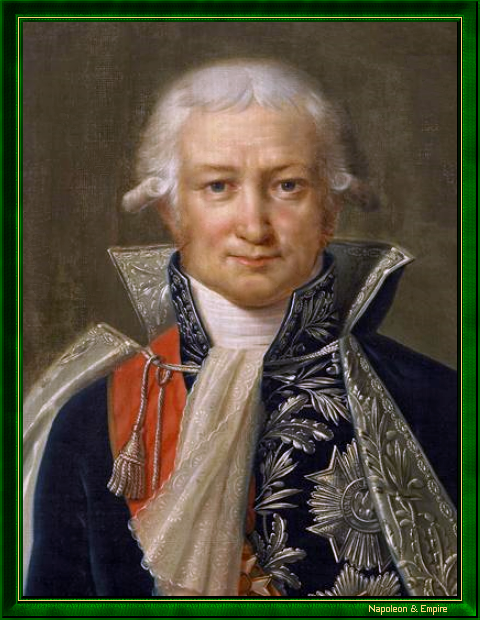Jean-Baptiste de Nompère de Champagny
Duke of Cadore
Pronunciation:

Champagny was born into a noble family in Roanne on August 4, 1756. A naval officer under the Ancien Régime, he took part in the American War of Independence.
In 1789, the nobility of Forez elected him deputy to the Estates-General. Although he had been one of the forty-seven aristocratic deputies to join the Tiers-État before the royal invitation, he showed himself to be moderate in opinion, little given to grandstanding, but an influential member of the marine committee.
When his term of office expired, he returned to Roanne and retired to his château in Anzy, where he spent the next few years, with the exception of the few months when the Terror threw him into prison. After his release on 9 Thermidor, he continued to steer clear of public life until 18 Brumaire.
First Consul Napoleon Bonaparte then called him to the Council of State, where he was attached to the Navy section. Champagny then inspected the prefectural administrations and, probably at the suggestion of Charles-François Lebrun, the third consul, was appointed ambassador to Austria (summer 1801).
Champagny's moderation and modest demeanor were a marvel to behold. Francis II of the Holy Roman Empire became godfather to the son born to him in Vienna and, above all, accepted the new map of Germany resulting from the 1803 Recès.
The following year, however, Champagny failed to secure Bonaparte's accession to the Empire. He was recalled. But on August 8, Napoleon entrusted him with the Ministry of the Interior, no doubt out of a desire to place a docile clerk at the head of this department, who would have no need to fear any hint of autonomy.
For the first few months, the Emperor expected his new minister to provide him with the soldiers he needed for the impending war. Later, however, Champagny went beyond the role of recruiting sergeant, devising a vast plan for public works - of which the Rue de Rivoli in Paris was one - and actively preparing the industrial exhibition scheduled for 1808.
He had to abandon all these projects in 1807, however, to take over from Charles-Maurice de Talleyrand-Périgord at the Ministry of Foreign Affairs (August 9), where the Emperor now wanted a disciplined, submissive executor.
Champagny proved to be the right man for the job. For almost four years, he conscientiously implemented Napoleon's diplomatic views. He carried out the substitution of a king in Spain, set up the continental blockade, negotiated the Peace of Vienna, prepared the Emperor's divorce and justified the annexation of Holland. This activity earned him the title of Count in 1808 and Duke of Cadore in 1809, which also served to boost his prestige ahead of the Erfurt negotiations.
But in 1811, for having supported a Franco-Russian alliance policy for too long, without perceiving Napoleon's changing views on the subject, he was forced to hand in his portfolio (April 16).
He was then entrusted with the stewardship of the crown estates, a sinecure. After briefly acting as Secretary of State, and then refusing the Ministry of the Navy, he became a senator in 1813.
The last months of the Empire saw his return to prominence. Secretary to the Regency Council, he accompanied empress Marie-Louise to Blois and, after Napoleon's fall, carried a letter from the Empress to her father, demanding recognition from Napoleon II. The Austrian Emperor refused, but treated the plenipotentiary as an old friend.
On his return to France, Champagny, finding King Louis XVIII installed in power, easily rallied to the Bourbons, who made him peer and rear-admiral.
During the Hundred Days, careful not to compromise himself too much, he accepted only the peerage and, once again, the stewardship of the crown estates.
However, on his return from Ghent, the King found this sufficient to strip him of his peerage. He restored it to him, as to so many others, in 1819.
Jean-Baptiste de Nompère de Champagny died on July 3, 1834 in Paris. He was buried in the Montparnasse cemetery.
"Jean-Baptiste de Nompère de Champagny, Duke of Cadore" by Antoine Jean Joseph Ansiaux (Liège 1764 - Paris 1840).

A small street in the Invalides district of Paris still bears his name.
His youngest son François (1804-1882) was an Academician and author of a remarkable Histoire de l'Empire romain in three parts and ten volumes.
Franc-maçonnerie : Jean-Baptiste de Nompère de Champagny fut grand conservateur du Grand Orient de France de 1806 à 1814.